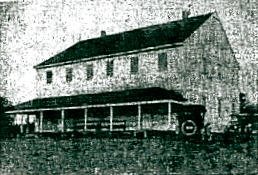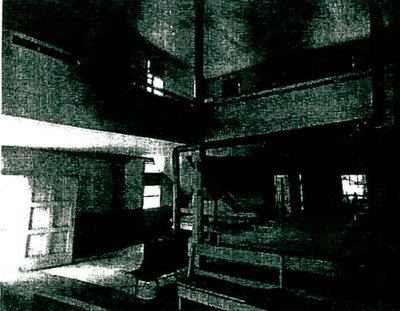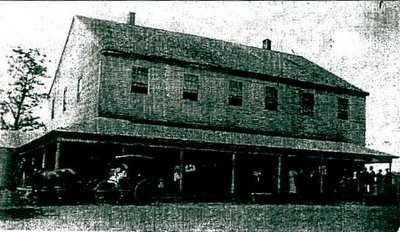
The following are some accounts of visits to Farmington. The ones from 1816 onward all or mostly all refer to the old Hicksite meetinghouse, now the subject of an effort to preserve and document the building. The one I'm not sure of was in the Hicksite meetinghouse was the visit of English Friend J.J. Gurney, a vocal opponent of the Hicksites, though in this case my recollection of the source is that as the Hicksite meetinghouse was larger than the Orthodox house, and lots of people were interested in hearing Gurney, the Hicksite house was opened to him.


TRAVELING IN THE MINISTRY: FRIENDS (AND A FEW OTHERS) VISIT FARMINGTON, 1794-1848.
Presented to Farmington Friends Church, by Christopher Densmore, January 30, 1994.
William Savery, 1794
[9th Month 30th] Abraham Lapham came to our lodgings and conducted us to his house, where we were kindly received and spent a pleasant day. This county has two great disadvantages attending it, the scarcity of springs and rivulets and the unhealthiness of the climate in its present uncultivated state, yet it is settling very fast, the land being very fertile; but as the Indians are all round and the settlements of the whites are very thin, there still is some danger to be apprehended. The first settlers have passed through great difficulties, having near one hundred miles to go to mill, and struggling under many privations to procure a living for their large families; some have staid for many weeks under shelter of bark and bushes before they could erect a hut.
[10 Month 19th] First-day. Held a meeting for worship; a considerable number attended, who lived generally from two to ten miles distant. Many of them came on foot, there being but few horses in this country and fewer wheel carriages of any kind. One family came a considerable distance upon a sled drawn by four stout oxen. The people were solid, and through Divine favour it proved a good meeting, many were very tender and parted with us lovingly. It does our hearts good to see the gratitude some of the poor frontier people manifest, and the pains they take to be at a religious meeting. O Philadelphians, how abundant ought your gratitude to be for the enjoyment of your multiplied blessings."
- Journal of the Life of William Savery, Friends Library 1 (1837): 350, 354
Joseph Hoag, 1807
[7 Mo. 1807] Second of the month, we had a meeting at Asa Aldrich's, in Palmyra-- a laborious exercising meeting. I was led to show that one fault-mender was worth many fault finders; as none could mend a fault but those who committed the fault, and while people were looking up others' faults, they certainly neglected their own. I had to come to plain work, and felt quite comfortable after it.
First day, 3d, we attended Farmington meeting; this was also a tribulating time to me. I was led to address the backsliders, who wanted to be esteemed, and, like Adam, were hidden under a fig-leaf covering; showing them, that would not do, as also the eagle-eyed, to spy out others' fault for an excuse for the neglect of their own duties, showing them the neglect of duty was wrong, and doing wrong was the neglect of duty; and why they were condemning others, they were acting like them, and ranking themselves in range with those they despised. This was not wise. I was enabled to open these points closed and plain, to the relief of my mind.
-- Journal... of Joseph Hoag. Auburn, New York: Knapp and Peck, 1861.
Lydia P. Mott, 1828
Lydia P. Mott having for some years resided near Scipio in New York state, informs us that in those newly settled countries, where Friends are fast increasing, and forming new settlements and meetings, the traveling of some active members in attending quarterly and monthly meetings at great distances, visiting Friends in their retired situations as committees, and attending their meetings by appointment, &c., has been known to occupy full one-half of the year...
Herself and several others were travelling in winter in a sleigh, in bitter cold weather, when they were obliged to seek shelter for the approaching night, when by inquiry they heard of a Friends house some miles distant, which they reached late in the evening, almost perished with cold and drifting snow. On calling at the door, inquiry was made who they were, before they were invited into the house; and on finding they were Friends, the lonely woman of the house let them in, but had no candle, and but little fire. The wood was mostly covered up by the deep snow that had lately fallen. Her husband had been gone for some time to a distant part of the country on business, and left only his tender wife to take care of his stock and the family of little children. She, however, welcomed the Friends as well as she could, directed where the barn was, and that they must see to their horses themselves, that they had fodder, &c., while she went out in the snow to cut some more wood to warm the strangers. Having renewed her fire, she then went about preparing some refreshment; her children being asleep in a bed in one corner of the only room the house contained. After the homely meal was over, she told them she would lodge them as well as she could, but she had no spare bed. She therefore gave up her own bed to two of them; the other two, by climbing up a step-ladder, obtained a lodging in an open loft, where the snow blew in upon them, but having a buffalo skin with them, they slept till morning without much suffering from the cold; while the mother reposed with her little children in a kind of truckle-bed on the floor.
-- Journal of the Life and Religious Labors... of John Comly. Philadelphia: T. Ellwood Chapman, 1853, pp. 359-360.
Priscilla Cadwallader, ca. 1835
When Genesee Yearly Meeting came on, though still sick in bed, she felt drawn to go to Farmington, and was able to visit both men's and women's meetings, and to deliver in each the message which she believed herself intrusted. In the woman's meeting, she spoke beautifully and impressively of that divine love that had inspired her soul, and have given her strength to arise from her sick bed to come and sit with us. In the men's meeting they were engaged in the consideration of a revision of our discipline, and she exhorted them to great care therein, and to seek for divine guidance in reference to every proposed change, lest they should inadvertently put it in the power of some to oppress others, and thereby obstruct that growth which Truth would sanction.
She remained at Farmington during the remainder of the Yearly Meeting week, but was only able to attend one other meeting. This was the public meeting held on fourth day. She then spoke interestingly to a very quiet, though very crowded audience. At this meeting she predicted our present national conflict, saying, "I hear the cannon's roar, and the beating of the drums, and I see the horse and his rider amid the clash of arms and pools of human blood. Oh, Carolina! Carolina! how I would gather thee as a hen gathers her chickens, but thou wilt not hear the call. Slavery will go down sooner or later, and I entreat you to wash your hands in innocency.
-- Memoir of Priscilla Cadwallader. 2nd ed. Philadelphia: Book Association of Friends, 1864.
Genesee Yearly Meeting at Farmington, 1838
That the discipline be so altered, that men and women shall stand on the same footing on all matters in which they are equally interested, such as alterations of the discipline; and on receiving and disowning members, and on granting certificates of removal, each branch of the monthly meeting shall obtain the concurrence of the other.
- Friends Intelligencer 1 (1838), p. 98.
Joseph John Gurney at Farmington, 1841
I know of no district in America, in which the anti-slavery cause, as well as that of total abstinence, are more vigorously maintained by the bulk of the population, than in the parts which I was now visiting. Great was the zeal of the young people, both amongst Friends and others, in the pursuit of these objects; and while we could not but admire the virtuous energy which prevailed amongst them, it seemed desirable to fix their attention on still higher objects, and to remind them of the Apostolic injunction, "Let your moderation be known to all men-- the Lord is at hand."
-- Joseph John Gurney, A Journey in North America. Norwich, England: Privately Printed, 1841. p. 309.
John Comly at Genesee Yearly Meeting, 1842
I saw no open door to cast off the burden of my concern, so remained silent.... Creaturely activity... is apt to seek relief from summering by the expression of words; to endeavour to throw off the burden before the time, as if it could do something thereby to forward the Lord's work. Ah! how abundant is this activity now among Friends! and professedly for advancing the testimonies of Truth! of all the families of the earth, Friends should understand this mystery of silent suffering in lamb-like meekness, when not Divinely called and qualified for active vocal service.
Much diversity of opinion prevails among members of this Yearly Meeting, arising as a branch of the tree of popular reform. But it is a superficial spirit that would throw off all restraint, and order, and discipline. Much mixture of creaturely activity is already interspersed among the ministry, even of many who are said to be in unity with Friends. The lecturing, wordy spirit of the times has affected even the professed gospel ministry of our society. But, alas! what can be expected when ministers do not think a renewed qualification of Divine ability necessary for the work! Surely, in such, the head is sick, and the heart (the life) faint.
[At South Farmington] This meeting was not large; we had a laboured communication from a stranger that occupied nearly the whole time; and it appeared to be a poor, lifeless meeting. Oh! how a lifeless ministry tends to shut up the springs of life Divine.
[On being invited to visit Canandaigua] I was invited and solicited to join the part, but declined as a practical testimony against the idolatry of gratifying curiosity in admiration and applause of the vanity of man. Ah! how few seem aware, while they are applauding the contrivance and show, the finery and superfluity, and extravagance of the rich, in their costly buildings and words of art, that they are not only worshipping the works of men's hands, but actually admiring and approving the fruits of oppression. For where does the superfluity of wealth arise from, but out of the gain of oppression, or fraud, or violence?
On fifth-day morning we returned to Farmington; and on the way, met a plain, aged Orthodox Friend who was inquiring the way to another orthodox Friend's house. As he stopped us for this purpose, he said he was "very sorry that we separated, but that now we must try to make it up in loving one another."
Much was said, many words were communicated; but I had again to recur to my lesson of the mystery of silent suffering with the seed of life, in confidence that Omnipotent power can do his own work, himself alone. So be it. His servants must not strive even to speak, where there is no room. They must not force their way, when He opens not a way for them. All they have to do, is stand ready to obey when He puts forth and goes before them, and opens a door of profitable utterance.
-- Journal of the Life and Religious Labors... of John Comly. Philadelphia: T. Ellwood Chapman, 1853, pp. 545-553.
Joseph C. Hathaway and Fugitive Slaves, 1842
A few days ago, a fugitive from Virginia gave me a call, on his way to a free country.... He arrived about 10 o'clock, and remained until after dinner; during which time, we had an opportunity of making many inquiries relative to the condition of our southern brethren in bonds. We urged him to remain over night with us; but he was impatient to set foot upon a soil where he could feel assured he was free. He was a fine looking fellow, of about nineteen, evidently possessing much native shrewdness. The Virginia, whose victim he was, staked him against $1000 in a cock-fight; and for fear his master might lose his wager, and he be sold to the South, he thought best to use the physical and intellectual powers God had given him, in finding a country where an immortal being is considered of too much value to have his destiny hang upon a chicken's foot.
-- National Anti-Slavery Standard, May 5, 1842.
[Fugitive slave "John Jacobs"] Aided by much friendly advice and information, he started for a free country; travelling in the nighttime, and concealing himself during the day. He says that the nights were very short, and the days very long; so anxious was he to get to a land of freedom. One evening, being almost worn out from his rapid journey, he ventured to call at a tavern for lodging. He had not been there long, when he heard a man read an advertisement, offering $600 reward for his apprehension; signed by his late master. John said he felt "every shape" while the man was reading. However, he pretended not to heed it, and took lodgings, for which he paid in advance. As soon as the family were all in bed, he arose, and pursued his journey. He grew afraid of human dwellings; mine was the third he had put his head into, since he had left his old home. He met with no one who befriended him, until the day before he reached here; when, as he passed a door, a man hailed him, and after inquiring his destination, gave him a good breakfast and a pair of boots.... I have no company of whom I am more proud than these panting fugitives...
- National Anti-Slavery Standard, August 11, 1842.
Sunderland P. Gardner, 1846
Nations war with each other-- opposing force to force, in a murderous vindictive spirit. But there are other wars, which, though not carried so far as to shed blood, yet the same ambitious war-like spirit may be prompt to action-- wrong may be wrongfully opposed, and war may be opposed in a war-like spirit...
-- Sunderland P. Gardner, "Address to the Youth and Children of the Religious Society of Friends," Friends Weekly Intelligencer 3 (1846): 177-9.
Benjamin F. Gue, 1848
Friday, Oct. 6, was warm and pleasant, this was the first day of the Conference held at the large meeting house. We attended and were much interested. In the evening went to a women's rights meeting held at the same place, it was attended by Elizabeth C. Stanton of Seneca Falls, she circulated a petition praying the Legislature to allow women of legal age to exercise the right of the Elective Franchise, which I signed.
- The diary of Benjamin F. Gue in Rural New York and Pioneer Iowa, 1847-1856. Ames, Iowa: Iowa State University Press, 1962.
Elizabeth Cady Stanton, 1848
One night, in the Quaker Meeting House at Farmington, I invited, as usual, discussion and questions when I had finished. We all waited in silence a long time; at length a middle-aged man, with a broad-brimmed hat, arose and responded in a sing-song tome: "All that I have to say is, if a hen can crow, let her crow," emphasizing "crow" with an upward inflection of several notes of the gamut. The meeting adjourned with mingled feelings of surprise and merriment. I confess that I felt somewhat chagrined in having what I considered my unanswerable arguments so summarily disposed of, and the serious impression I had made on the audience so speedily dissipated. The good man intended no disrespect, as he told me afterwards. He simply put the whole argument in a nutshell: "Let a woman do whatever she can."
- Elizabeth Cady Stanton. Eighty Years and More: Reminiscences, 1815-1897. New York: Shocken Books, 1975, p. 151.
I should feel exceedingly diffident to appear before you at this time... were I not nerved by a sense of right and duty, did I not feel the time had fully come for the question of woman's wrongs to be laid before the public, did I not believe that woman herself must do this work; for woman alone can understand the height, and the breadth of her own degradation. Man cannot speak for here, because he has been educated to believe that she differs from him so materially, that he cannot judge of her thoughts, feelings, and opinions by his own. Moral beings can only judge of others by themselves. The moment they assume a different nature of any of their own kind, they fail utterly...
[Note: This was the speech delivered by Stanton at the first Woman's Rights Convention in Seneca Falls in July 1848. It is probably similar to that delivered by her that year in the Friends Meeting Houses at Junius and Farmington, and elsewhere in Western New York.]
- Elizabeth Cady Stanton, Susan B. Anthony, Correspondence, Writings and Speeches. Edited by Ellen Carol DuBois. New York: Schocken Books, 1981, p. 27.
Christopher Densmore, Curator
Friends Historical Library
Swarthmore College
500 College Avenue
Swarthmore, Pennsylvania 19081-1399
No comments:
Post a Comment